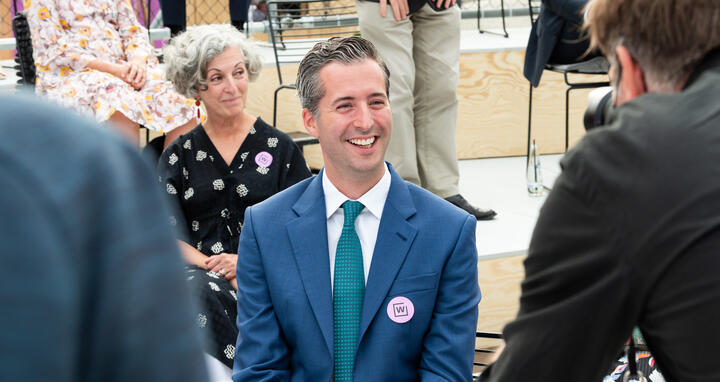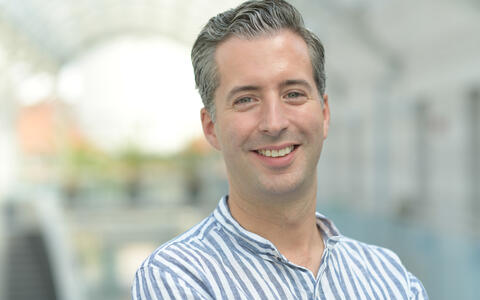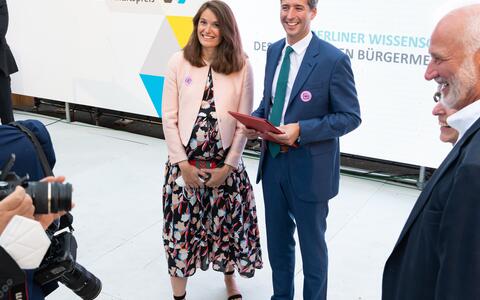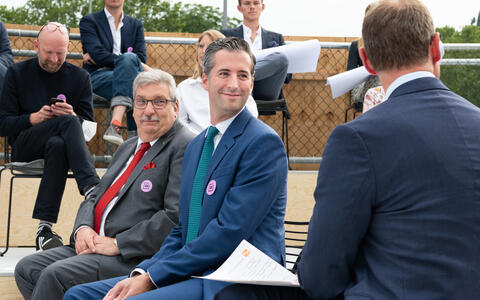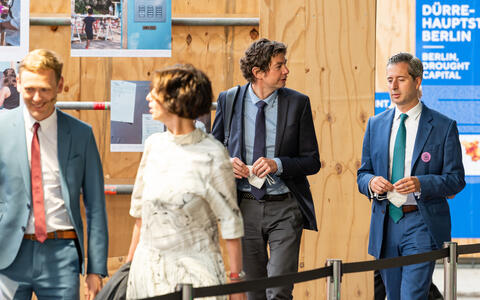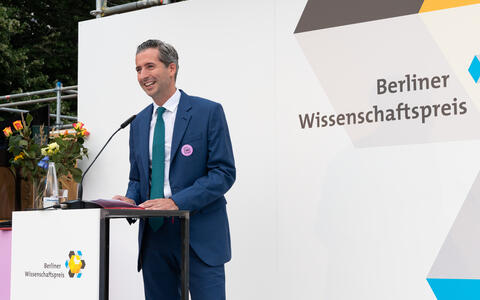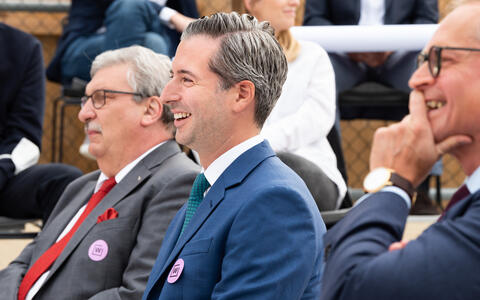📺 Anton Henssen honored with Berlin science award
Anton Henssen has been awarded the 2020 Berliner Wissenschaftspreis in the Young Investigator category. The pediatric oncologist is a group leader at the Experimental and Clinical Research Center (ECRC), a joint institution of the Max Delbrück Center for Molecular Medicine in the Helmholtz Association (MDC) and Charité – Universitätsmedizin. Henssen studies the causes of rare pediatric tumor types such as neuroblastoma. Here he focuses on the role played by small DNA rings – a completely new genetic mechanism of cancer formation – and uses technologies like single-cell analysis. His goal is to one day be able to treat his young patients better with personalized therapies. In addition to conducting research on the Buch campus, Henssen works at Charité as a physician in the Department of Pediatric Oncology and Hematology. His research, according to an official statement, is deeply embedded in the scientific fabric of the capital region and is an outstanding example of the impact that application-oriented research can have.

The Young Investigator Award, which includes a €10,000 cash prize, is given each year in conjunction with the Berliner Wissenschaftspreis to early career researchers who are 35 years old or younger. The award recognizes innovative research in a future-oriented field that could particularly benefit Berlin as a science and business location. The Berliner Wissenschaftspreis promotes outstanding achievements in science and research that have been made in Berlin. A central aim is to lay the foundation for the further economic development of Berlin. The 2020 award, which is being presented for the thirteenth time and is endowed with €40,000, goes this year to Professor Christian Drosten. The presentation of the award had been postponed in fall 2020 due to the pandemic and has now taken place for as part of Wissensstadt Berlin 2021.
“The recognition goes to a team”
Through his cutting-edge research, Henssen is laying important groundwork that will allow us to achieve new breakthroughs in the diagnosis and treatment of childhood cancers. The two award winners show through their research just how strong Berlin science is, and our city can be rightly proud of that.
“I am delighted and very honored to receive this award,” Henssen said after the presentation ceremony. “Even though the award was presented to me, the recognition goes to a team of international collaboration partners, because the research done by my lab would not have been possible without such teamwork.”
Berlin’s Governing Mayor and Senator for Higher Education and Research Michael Müller stressed: “Through his cutting-edge research, Henssen is laying important groundwork that will allow us to achieve new breakthroughs in the diagnosis and treatment of childhood cancers. The two award winners show through their research just how strong Berlin science is, and our city can be rightly proud of that.”
Professor Thomas Sommer, interim Scientific Director of the MDC, said: “I am absolutely delighted and congratulate Anton Henssen on this great award. In my view, Henssen ideally combines basic research and direct application. He brings his knowledge and experience as a clinical oncologist to his laboratory work, while also using his innovative research approaches and findings to help children afflicted with cancer. I sincerely wish Henssen and his team much success on this path.”
About the award winner
Anton Henssen, a pediatric oncologist, grew up in Düsseldorf and has since late 2018 been working at the Berlin-based Experimental and Clinical Research Center (ECRC), a joint institution of the Max Delbrück Center for Molecular Medicine and Charité – Universitätsmedizin Berlin. Henssen, 35, received his PhD from RWTH Aachen University in 2013 following neuroscience training at Forschungszentrum Jülich. He was deeply involved in treating childhood cancers for the first time as a junior physician at the University Hospital Essen. During a research stay in the United States at Memorial Sloan Kettering Cancer Center in New York (2013 to 2016), he specialized in DNA sequencing of childhood cancers.
In 2016 he came to Berlin to work in the Clinician Scientist Program of the Berlin Institute of Health at Charité (BIH) and Charité – Universitätsmedizin Berlin. Since the end of 2018 Henssen has led the Emmy Noether Research Group “Genomic Instability in Pediatric Cancer” at the ECRC, which is also a guest group at the MDC. Since 2020 his research has been funded by a Starting Grant from the European Research Council (ERC). In addition to conducting research on the Buch campus, Henssen works at Charité as a physician in the Department of Pediatric Oncology and Hematology.
Further information
- Berliner Wissenschaftspreis and previous award winners
- Live stream of the event plus videos of the award winners
- The DNA artist: A portrait of Anton Henssen
- Lord of the rings: Kind Philipp Award goes to Anton Henssen
- In pursuit of the origin and role of ecDNA: Anton Henssen receives ERC Starting Grant
- How circular DNA causes cancer in children
- Henssen Lab, Genomic Instability in Pediatric Cancer
Downloadable image
Photo of Anton Henssen. Credit: Wiebke Peitz, Charité
Contact
Jana Schlütter
Editor, Communications Department
Max Delbrück Center for Molecular Medicine in the Helmholtz Association (MDC)
Phone: +49-(0)30-9406-2121
jana.schluetter@mdc-berlin.de or presse@mdc-berlin.de
- Max-Delbrück-Centrum for Moleculare Medicine (MDC)
The Max Delbrück Center for Molecular Medicine in the Helmholtz Association (MDC) is one of the world’s leading biomedical research institutions. Max Delbrück, a Berlin native, was a Nobel laureate and one of the founders of molecular biology. At the MDC’s locations in Berlin-Buch and Mitte, researchers from some 60 countries analyze the human system – investigating the biological foundations of life from its most elementary building blocks to systems-wide mechanisms. By understanding what regulates or disrupts the dynamic equilibrium in a cell, an organ, or the entire body, we can prevent diseases, diagnose them earlier, and stop their progression with tailored therapies. Patients should benefit as soon as possible from basic research discoveries. The MDC therefore supports spin-off creation and participates in collaborative networks. It works in close partnership with Charité – Universitätsmedizin Berlin in the jointly run Experimental and Clinical Research Center (ECRC), the Berlin Institute of Health (BIH) at Charité, and the German Center for Cardiovascular Research (DZHK). Founded in 1992, the MDC today employs 1,600 people and is funded 90 percent by the German federal government and 10 percent by the State of Berlin. www.mdc-berlin.de

